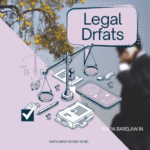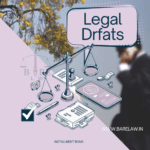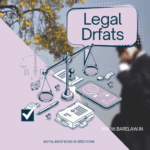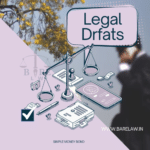
FORM OF REVISION IN DISTRICT COURT
IN THE COURT OF THE DISTRICT JUDGE, AGRA
Civil Rev. No………………… of 19………………..
U/s. 115 C. P. C.
A. B…………………………………………. Plaintiff/Applicant.
versus
C. D…………………………………… Defendant/Respondent.
Valuation of suit property: Rs. 5000/-
Nature of suit: Suit for injunction
Court fee paid on Revision Application: Rs. 10/-
Sir,
The Revision application against the order dt. 25-11-1985 of the XVIII Additional Munsif, Agra in suit No. 742 of 1973 is most respectfuly submitted on the following grounds:
GROUNDS OF REVISION
1. Because the learned Trial Court has failed to exercise his jurisdiction vested in him, in not considering the amendment application in its proper and legal aspect.
2. Because the amendment sought does not purport to change the nature of the suit, it is a suit for injunction against the defendant for restraining him from illegally closing the door, windows and sky lights of the plaintiff and complainant after having to his notice the correct facts about the nature of possession of the defendant over the servient heritage, asked to add a relief about compensation as envisaged in S. 32 of the Easements Act and its illustration which directly applies to the applicant’s case. The Learned Munsif has not given any consideration to this contention of the applicant and has arbitrarily passed the impugned order.
3. Because the applicant has also sought to amend the site plan of the property about which the relief of injunction is claimed. The learned Munsif has not considered at all this part of the proposed amendment and has evaded to give his decision thereon.
PRAYER
It is, therefore, most respectfully prayed that the Revision application may be allowed, setting aside the order of the learned Munsif and allowing the application for amendment of the plaintiff.
Dated 6-12-1985. Counsel for the Plaintiff
case law
Section 115
INTERFERENCE WITH ERRONEOUS DECISION ON POINT OF LIMITATION.
When the lower Court decides a question of limitation erroneously on a wrong view of law, the High Court will interfere with such decision in its revisional jurisdiction1.
INTERFERENCE WITH ORDER DISPOSING OF AMENDMENT APPLICATION.
A trial Court while disposing of an application for amendment of pleadings exercises a judicial discretion vested in it by law, the High Court in exercise of its revisional powers has to see whether the discretion vested in the trial Court has been exercised or not and whether it has exercised the jurisdiction illegally or with material irregularity2.
ISSUE OF LAW REQUIRING EVIDENCE TO BE RECORDED DECIDED AS PRELIMINARY ISSUE — INTERFERENCE IN REVISION.
Where the order of the trial court treating an issue of law on which evidence had to he recorded as preliminary issue is erroneous and must he treated as cither without jurisdiction or in excess of jurisdiction, the High Court can set aside such an erroneous order in its revisional jurisdiction3.
REFUSAL TO INTERFERE WHEN SUBSTANTIAL JUSTICE DONE.
Where a case even fell under any of the three clauses, but substantial justice has been done by the impugned order of the Court below, between the parties, and the applicant revisionist is not going to lose any amount if the decree is passed on interference is called for4.
WHEN REVISION RENDERED INFRUCTUOUS.
Where a judgment debtor’s house was attached in execution proceedings, objection was filed by judgment debtor claiming protection under section 60(1) (C.C.C.), which was dismissed. The judgment debtor died pending revision, the revision was held to have become infructuous5.
NON-FILING OF COPY OF TRIAL COURT JUDGMENT IN REVISION: EFFECT OF.
According to Rules and Orders of Punjab High Court, the petition for revision of an order of the appellate Court copy of order of the Court of first instance shall be accompanied without the revision shall be incompetent if copy is not filed within time6.
LIMITATIONS OF HIGH COURT.
High Court will be slow to interfere unless there is manifest prejudice to either party. Muchlcss there should be ground for interference in revision.7
High Court cannot correct errors of fact, however, gross or even errors of law unless the said errors gave relation to the jurisdiction of the Court to try the dispute.8
High Court’s powers are Limited to see whether in a case decided there has been an assumption of jurisdiction where none existed, or a refusal of jurisdiction where it did, or there has been material irregularity or illegality in the exercise of that jurisdiction. The exercise of power is confined to jurisdiction and jurisdiction alone9.
The power under Order 41 Rule 27 should be exercised cautiously and sparingly.10
1. Mst. Sundari v. Sakal Salim, A.I.R. 1973 Pat. 150: 1973 B. L. J. R. 89.
2. Dr. Mrs. Sarojini Pradhan v. Krirodc Chandra Pradhan, (1973) 39 C. L. T. 330.
3. Smt. Ram Kali v. Sohan Lal, A.I.R. 1985 P&H 124: 1984 Rev. L. R. 538: 1984 Punj. L. J. 600: 1984 (2) Land. L. R. 458.
3a. Mrs. Tara Sarup v. M/s. Piara, Singh Gurmail Singh and others, A.I.R. 1985 N. O. C. 167 (P&H): (1984) 86 P. L. R. 605.
4. Dena Bank v. M/s. Devi Exhibitors, Surat, A.I.R. 1985 Guj. 51, (55): 1984 (2) Guj. L. R. 1040: 1984 Guj. L. H. 192.
5. K. L. Bawa v. M/s. Basant Textiles, Meerut, A.I.R. 1982 Punj. 275: 1982 Rev.L.R. 120: (1982) 84 P.L.R. 258: (1982) 1 Rent.L.R. 309.
6. Shafiq Ahmed v. Mst. Shah Jehan Begum, A.I.R. 1981 Delhi 202.
7. Arun General Industries Ltd. Calcutta v. Rishab Manufacturers Pvt. Ltd., 1972 M.P.L.J. 42.
8. M/s. Kalinga Otto Pvt. Ltd. v. M/s. Charanjit Kochhar, 1971 (2) C.W.R. 748.
9. The Superintending Canal Officer v. Hukum Chand, A.I.R. 1972 P&H 60: 1971Cur. L.J. 732: AA.I.R. 1963 S.C. 698 followed.
10. Jhari Rai v. Sukar Mandal 1996 (3) C.C.C. 164 (Pat.).
Barelaw, an online platform dedicated to delivering comprehensive legal knowledge, proudly presents its exclusive category of case briefs. This section is meticulously crafted to offer insightful analyses of landmark judgments, providing a valuable resource for legal professionals, students, and anyone interested in understanding the intricacies of law. Our case briefs delve deep into pivotal court decisions, exploring the rationale behind each judgment and its impact on the legal landscape.
We understand that navigating the complexities of legal judgments can be challenging. That’s why our case briefs are designed to be both informative and accessible, ensuring that readers gain a clear understanding of the key legal principles involved. Each brief includes a summary of the facts, the legal issue at hand, the court’s reasoning, and the ultimate decision. This structured approach makes it easier for our audience to grasp the nuances of each case.
Our website is a treasure trove of legal wisdom, constantly updated with the latest and most significant cases. Whether you’re a law student seeking to enhance your knowledge, a practicing attorney looking for a quick reference, or simply a curious mind eager to understand the law’s evolution, Barelaw is your go-to destination.
Explore our case briefs and immerse yourself in the world of law. Visit our website now and discover the wealth of legal knowledge at your fingertips. The link is provided below for your convenience and direct access to our expansive legal database
You can access more legal drafts here – https://www.barelaw.in/legal-drafts/





